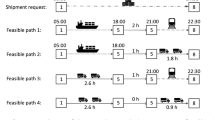Abstract
Global synchromodal transportation involves the movement of container shipments between inland terminals located in different continents using ships, barges, trains, trucks, or any combination among them through integrated planning at a network level. One of the challenges faced by global operators is the matching of accepted shipments with services in an integrated global synchromodal transport network with dynamic and stochastic travel times. The travel times of services are unknown and revealed dynamically during the execution of transport plans, but the stochastic information of travel times are assumed available. Matching decisions can be updated before shipments arrive at their destination terminals. The objective of the problem is to maximize the total profits that are expressed in terms of a combination of revenues, travel costs, transfer costs, storage costs, delay costs, and carbon tax over a given planning horizon. We propose a sequential decision process model to describe the problem. In order to address the curse of dimensionality, we develop a reinforcement learning approach to learn the value of matching a shipment with a service through simulations. Specifically, we adopt the Q-learning algorithm to update value function estimations and use the \(\epsilon \)-greedy strategy to balance exploitation and exploration. Online decisions are created based on the estimated value functions. The performance of the reinforcement learning approach is evaluated in comparison to a myopic approach that does not consider uncertainties and a stochastic approach that sets chance constraints on feasible transshipment under a rolling horizon framework.











Similar content being viewed by others
References
Abdulhai, B., & Kattan, L. (2003). Reinforcement learning: Introduction to theory and potential for transport applications. Canadian Journal of Civil Engineering, 30(6), 981–991. https://doi.org/10.1139/l03-014.
Chang, T. S. (2008). Best routes selection in international intermodal networks. Computers& Operations Research, 35(9), 2877–2891. https://doi.org/10.1016/j.cor.2006.12.025.
Chen, Z., & Fan, W. D. (2020). Analyzing travel time distribution based on different travel time reliability patterns using probe vehicle data. International Journal of Transportation Science and Technology, 9(1), 64–75. https://doi.org/10.1016/j.ijtst.2019.10.001.
Çimen, M., & Soysal, M. (2017). Time-dependent green vehicle routing problem with stochastic vehicle speeds: An approximate dynamic programming algorithm. Transportation Research Part D: Transport and Environment, 54, 82–98. https://doi.org/10.1016/j.trd.2017.04.016.
Demir, E., Burgholzer, W., Hrušovský, M., Arıkan, E., Jammernegg, W., & van Woensel, T. (2016). A green intermodal service network design problem with travel time uncertainty. Transportation Research Part B: Methodological, 93, 789–807. https://doi.org/10.1016/j.trb.2015.09.007.
Ehmke, J. F., Campbell, A. M., & Urban, T. L. (2015). Ensuring service levels in routing problems with time windows and stochastic travel times. European Journal of Operational Research, 240(2), 539–550. https://doi.org/10.1016/j.ejor.2014.06.045.
Gendreau, M., Jabali, O., & Rei, W. (2016). 50th anniversary invited article-future research directions in stochastic vehicle routing. Transportation Science, 50(4), 1163–1173. https://doi.org/10.1287/trsc.2016.0709.
Guo, W., Atasoy, B., van Blokland, W.B., & Negenborn, R.R. (2020b). A global intermodal shipment matching problem under travel time uncertainty. In: Lecture notes in computer science, Springer International Publishing (pp. 553–568). https://doi.org/10.1007/978-3-030-59747-4_36
Guo, W., Atasoy, B., van Blokland, W. B., & Negenborn, R. R. (2020). A dynamic shipment matching problem in hinterland synchromodal transportation. Decision Support Systems. https://doi.org/10.1016/j.dss.2020.113289.
Guo, W., Atasoy, B., van Blokland, W. B., & Negenborn, R. R. (2021). Anticipatory approach for dynamic and stochastic shipment matching in hinterland synchromodal transportation. Flexible Services and Manufacturing Journal. https://doi.org/10.1007/s10696-021-09428-5.
Guo, W., Atasoy, B., van Blokland, W. B., & Negenborn, R. R. (2021). Global synchromodal transport with dynamic and stochastic shipment matching. Transportation Research Part E: Logistics and Transportation Review, 152, 102404. https://doi.org/10.1016/j.tre.2021.102404.
Hrušovský, M., Demir, E., Jammernegg, W., & van Woensel, T. (2016). Hybrid simulation and optimization approach for green intermodal transportation problem with travel time uncertainty. Flexible Services and Manufacturing Journal, 30(3), 486–516. https://doi.org/10.1007/s10696-016-9267-1.
Lee, C. Y., & Song, D. P. (2017). Ocean container transport in global supply chains: Overview and research opportunities. Transportation Research Part B: Methodological, 95, 442–474. https://doi.org/10.1016/j.trb.2016.05.001.
Lian, F., He, Y., & Yang, Z. (2020). Competitiveness of the China-Europe railway express and liner shipping under the enforced sulfur emission control convention. Transportation Research Part E: Logistics and Transportation Review, 135, 101861. https://doi.org/10.1016/j.tre.2020.101861.
Lin, D. Y., & Chang, Y. T. (2018). Ship routing and freight assignment problem for liner shipping: Application to the northern sea route planning problem. Transportation Research Part E: Logistics and Transportation Review, 110, 47–70. https://doi.org/10.1016/j.tre.2017.12.003.
Li, X., Tian, P., & Leung, S. C. (2010). Vehicle routing problems with time windows and stochastic travel and service times: Models and algorithm. International Journal of Production Economics, 125(1), 137–145. https://doi.org/10.1016/j.ijpe.2010.01.013.
Mao, C., & Shen, Z. (2018). A reinforcement learning framework for the adaptive routing problem in stochastic time-dependent network. Transportation Research Part C: Emerging Technologies, 93, 179–197. https://doi.org/10.1016/j.trc.2018.06.001.
Meng, Q., Wang, S., Andersson, H., & Thun, K. (2014). Containership routing and scheduling in liner shipping: Overview and future research directions. Transportation Science, 48(2), 265–280. https://doi.org/10.1287/trsc.2013.0461.
Meng, Q., Zhao, H., & Wang, Y. (2019). Revenue management for container liner shipping services: Critical review and future research directions. Transportation Research Part E: Logistics and Transportation Review, 128, 280–292. https://doi.org/10.1016/j.tre.2019.06.010.
Mes, M.R.K., & Rivera, A.P. (2017). Approximate dynamic programming by practical examples. In: International series in operations research & management science, Springer International Publishing (pp. 63–101). https://doi.org/10.1007/978-3-319-47766-4_3
Powell, W. B. (2019). A unified framework for stochastic optimization. European Journal of Operational Research, 275(3), 795–821. https://doi.org/10.1016/j.ejor.2018.07.014.
Ritzinger, U., Puchinger, J., & Hartl, R. F. (2015). A survey on dynamic and stochastic vehicle routing problems. International Journal of Production Research, 54(1), 215–231. https://doi.org/10.1080/00207543.2015.1043403.
Rivera, A. E. P., & Mes, M. R. (2017). Anticipatory freight selection in intermodal long-haul round-trips. Transportation Research Part E: Logistics and Transportation Review, 105, 176–194. https://doi.org/10.1016/j.tre.2016.09.002.
Rodrigues, F., Agra, A., Christiansen, M., Hvattum, L. M., & Requejo, C. (2019). Comparing techniques for modelling uncertainty in a maritime inventory routing problem. European Journal of Operational Research, 277(3), 831–845. https://doi.org/10.1016/j.ejor.2019.03.015.
SteadieSeifi, M., Dellaert, N., Nuijten, W., van Woensel, T., & Raoufi, R. (2014). Multimodal freight transportation planning: A literature review. European Journal of Operational Research, 233(1), 1–15. https://doi.org/10.1016/j.ejor.2013.06.055.
Sun, Y., & Lang, M. (2015). Modeling the multicommodity multimodal routing problem with schedule-based services and carbon dioxide emission costs. Mathematical Problems in Engineering, 2015, 1–21. https://doi.org/10.1155/2015/406218.
Sun, Y., Lang, M., & Wang, D. (2015). Optimization models and solution algorithms for freight routing planning problem in the multi-modal transportation networks: A review of the state-of-the-art. The Open Civil Engineering Journal, 9(1), 714–723. https://doi.org/10.2174/1874149501509010714.
Sutton, R. S., & Barto, A. G. (2018). Reinforcement learning: An introduction. Cambridge: MIT Press.
van Riessen, B., Negenborn, R. R., & Dekker, R. (2016). Real-time container transport planning with decision trees based on offline obtained optimal solutions. Decision Support Systems, 89, 1–16. https://doi.org/10.1016/j.dss.2016.06.004.
Yang, D., Pan, K., & Wang, S. (2018). On service network improvement for shipping lines under the one belt one road initiative of china. Transportation Research Part E: Logistics and Transportation Review, 117, 82–95. https://doi.org/10.1016/j.tre.2017.07.003.
Yee, H., Gijsbrechts, J., & Boute, R. (2021). Synchromodal transportation planning using travel time information. Computers in Industry, 125, 103367. https://doi.org/10.1016/j.compind.2020.103367.
Acknowledgements
This research is financially supported by the National Key R&D program of China under Grant 2019YFB1600400, by the project “Complexity Methods for Pre dictive Synchromodality” (Project 439.16.120) of the Netherlands Organisation for Scientic Research (NWO), as well as by the Natural Sciences and Engineering Council of Canada (NSERC) through its Cooperative Research and Development Grants Program.
Author information
Authors and Affiliations
Corresponding author
Ethics declarations
Conflicts of interest
The authors declare that they have no conict of interest.
Additional information
Publisher's Note
Springer Nature remains neutral with regard to jurisdictional claims in published maps and institutional affiliations.
Rights and permissions
About this article
Cite this article
Guo, W., Atasoy, B. & Negenborn, R.R. Global synchromodal shipment matching problem with dynamic and stochastic travel times: a reinforcement learning approach. Ann Oper Res (2022). https://doi.org/10.1007/s10479-021-04489-z
Accepted:
Published:
DOI: https://doi.org/10.1007/s10479-021-04489-z




